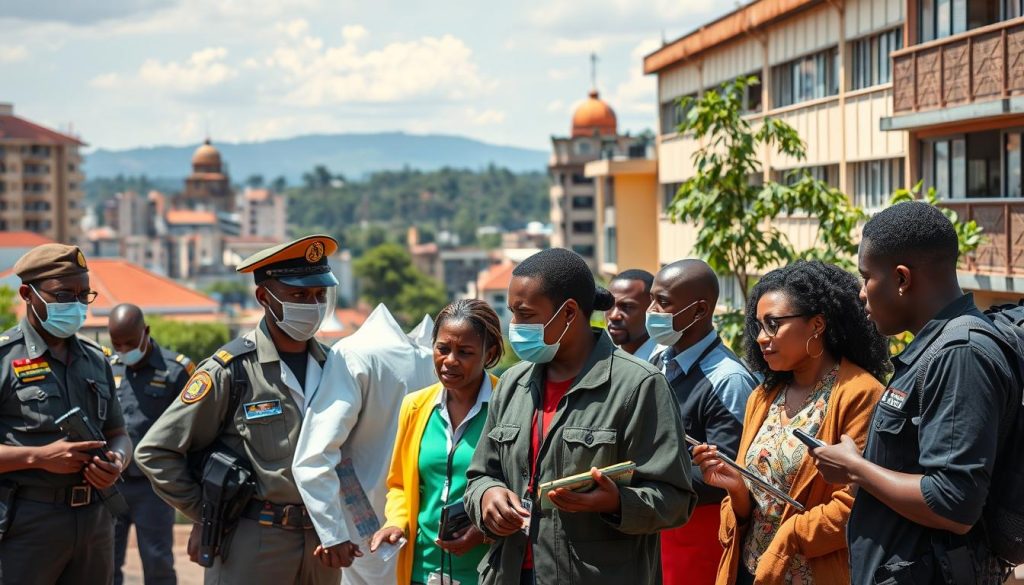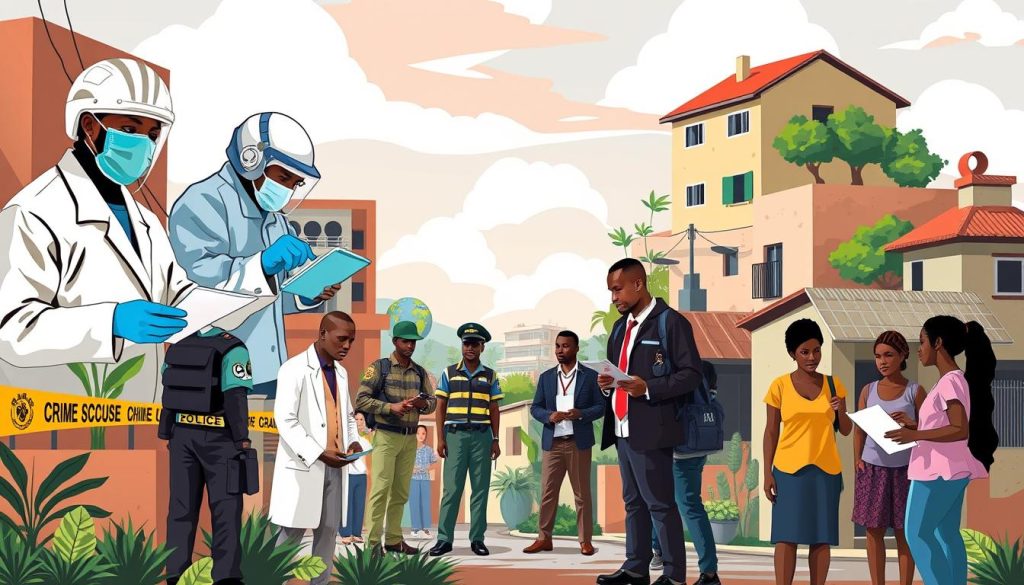As someone interested in criminology in Kenya, I’ve wondered if it’s a good career choice.
Criminology studies crime, criminal behavior, and the justice system.
It’s become more important as our world changes fast.
In this guide, we’ll look at criminology in Kenya, the job market, and what the future holds for graduates.
By the end, you’ll know if criminology is a good career in Kenya.
Key Takeaways
- Criminology covers many areas, like crime analysis, forensics, and managing the criminal justice system.
- The job market for criminologists in Kenya is expanding, with jobs in both the public and private sectors.
- Salaries for criminologists in Kenya vary, but there’s room for growth and specialized roles.
- Criminology graduates in Kenya can find many career paths, from law enforcement to teaching and policy-making.
- However, challenges like low public awareness and funding might slow the growth of criminology in Kenya.
What is Criminology and Its Scope in Kenya
Criminology is the study of crime and the justice system. It covers many topics. This offers many career paths for those interested in crime and law.
Key Areas of Study in Criminology
The main areas of study in Kenya include:
- Criminal behavior and psychology: Looking at why people commit crimes, like mental health and social factors.
- Forensic science and investigation: Using science to solve crimes by analyzing evidence.
- Law enforcement and policing: Studying how police prevent and solve crimes and work with communities.
- Corrections and rehabilitation: Examining how prisons and probation help offenders change and not commit crimes again.
- Criminological theory and research: Creating and testing theories to understand and prevent crime.
Academic Requirements for Criminology
To work in criminology in Kenya, you need a bachelor’s degree. You’ll need skills like:
- Strong analytical and critical thinking skills
- Proficiency in research methods and data analysis
- Knowledge of the criminal justice system and legal processes
- Familiarity with forensic science and investigation techniques
- Excellent written and verbal communication skills
Available Learning Institutions in Kenya
Many universities and colleges in Kenya offer criminology programs. Some include:
| Institution | Program | Degree Level |
|---|---|---|
| University of Nairobi | Criminology and Security Studies | Bachelor’s, Master’s, and PhD |
| Kenyatta University | Criminology and Security Management | Bachelor’s and Master’s |
| Moi University | Criminology and Criminal Justice | Bachelor’s |
| Kenya Methodist University | Criminology and Security Studies | Bachelor’s |
Current State of Criminology Job Market in Kenya
The criminology job market in Kenya is full of opportunities. It needs people with the right skills and qualifications. The demand for criminologists is growing, both in the public and private sectors. This makes it a promising time for those looking to start a career in this field.
Recent reports show that criminology jobs in Kenya cover many areas. These include law enforcement, forensic investigation, security management, and policy development. The focus on preventing crime and making decisions based on data has increased the need for skilled criminologists.
The need for criminologists is especially high in government agencies. These include the Kenyan Police Service, the National Intelligence Service, and the Prison Service. They see the value of using criminological insights in their work. The private sector, like security firms and risk management consultancies, also needs criminology graduates. They look for people who can help with threat assessment, risk mitigation, and corporate investigations.
While the criminology job market in Kenya looks promising, it’s key for aspiring professionals to keep up with trends and skills. By doing so, criminologists in Kenya can succeed in this fast-changing field.

Is Criminology Marketable in Kenya Really?
Looking into criminology as a career in Kenya shows an interesting picture. Criminology studies the link between crime, justice, and society. Let’s explore the job market, salary, and growth for criminologists in Kenya.
Employment Statistics and Trends
The need for criminology experts in Kenya is growing. Employment statistics show an 8% yearly increase in jobs in law, security, and justice. This means many chances for graduates to find good jobs in both public and private sectors.
Salary Expectations for Criminologists
The salary expectations for criminologists in Kenya depend on experience and role. Starting jobs pay between KES 40,000 to KES 60,000 monthly. With more experience, salaries can go up to KES 100,000 monthly for senior roles.
Growth Potential in the Field
The growth potential in criminology in Kenya looks good. With a focus on safety and justice, the need for experts will keep growing. Criminologists can work in many areas, from law to research, offering chances for growth and development.
In summary, criminology seems to be a promising and rewarding career in Kenya. It’s great for those who want to tackle crime and justice issues.

Career Paths for Criminology Graduates in Kenya
Criminology offers many career paths for graduates in Kenya. You can work in law enforcement, the private sector, or research. It’s a field that gives you a strong base for your career.
Law Enforcement and Criminal Justice
Many criminology graduates become police officers or detectives. They also work as crime scene investigators or in prisons. These jobs need a good understanding of crime and the law.
Private Security and Corporate Investigations
Private sector jobs are also available. Criminology graduates can work in security and corporate investigations. They help protect businesses and information.
Research and Policymaking
For those interested in research, criminology graduates can work in data analysis and policymaking. They help governments and think tanks with studies and policies. This work aims to improve public safety.
Criminology graduates have valuable skills. They can make a difference in many fields. With hard work and a passion for justice, they can help create a safer society.
| Career Path | Key Responsibilities | Required Qualifications |
|---|---|---|
| Law Enforcement |
|
|
| Private Security |
|
|
| Research and Policymaking |
|
|

Government Opportunities for Criminologists
Criminology is a field that offers many jobs in the government of Kenya. People with a criminology background can find careers in the police, intelligence services, and correctional services. Let’s look at the roles and duties in these areas.
Police Service Positions
Criminologists can work in the Kenyan police. They help with criminal investigations, forensic analysis, and preventing crimes. They analyze crime patterns, create policing strategies, and give expert opinions in court.
Intelligence Services Roles
Criminology skills are important in the intelligence services. Criminologists can be intelligence analysts, security consultants, or counterterrorism specialists. They help gather, analyze, and understand intelligence to spot threats and plan security.
Correctional Services Opportunities
In the Kenyan correctional services, criminologists use their knowledge of crime and rehabilitation. They work as probation officers, parole officers, or program managers. They create and run rehabilitation programs and check on offenders’ progress.
These jobs in Kenya’s government offer many career paths for criminologists. They can use their skills to make a difference in public safety and the justice system. With the right skills and qualifications, criminology graduates can find meaningful jobs in government agencies.
| Government Sector | Criminology-Related Roles | Key Responsibilities |
|---|---|---|
| Police Service | Criminal Investigator, Forensic Analyst, Crime Prevention Specialist | Analyze crime patterns, develop policing strategies, provide expert testimony |
| Intelligence Services | Intelligence Analyst, Security Consultant, Counterterrorism Specialist | Gather and analyze intelligence data, identify threats, develop security measures |
| Correctional Services | Probation Officer, Parole Officer, Correctional Program Manager | Develop rehabilitation programs, monitor offenders’ progress, facilitate reintegration |
Private Sector Jobs for Criminology Graduates
Criminology is not just for law enforcement anymore. The private sector is also looking for criminology graduates. They value their skills in corporate security and risk management.
In corporate security, criminologists can protect companies from threats. They know about criminal behavior and how to keep businesses safe. They might work as security managers or private investigators.
In risk management, criminologists help companies avoid risks. They use their knowledge of crime trends to keep businesses safe. They can work as risk analysts or security consultants.
But it’s not just big companies that need criminologists. Private investigation firms also hire them. They use their skills to solve mysteries and help in court cases.
| Private Sector Criminology Jobs | Key Responsibilities | Salary Range (Kenya)* |
|---|---|---|
| Corporate Security Manager | Develop and implement security strategies, manage security personnel, and investigate incidents | KES 500,000 – KES 1,000,000 |
| Risk Analyst | Analyze data, identify potential risks, and recommend mitigation strategies | KES 350,000 – KES 800,000 |
| Private Investigator | Conduct surveillance, gather evidence, and assist in legal cases | KES 300,000 – KES 700,000 |
The private sector is growing fast. Criminology graduates with the right skills can find great jobs. They will have a chance to make a real difference in their careers.
Skills Required to Succeed in Criminology
To succeed in criminology, you need a mix of technical skills, soft skills, and certifications. These are key for those aiming high in this field. Let’s explore the essential skills for a criminologist in Kenya.
Technical Competencies
Criminology needs a solid base in several areas. You must be good at data analysis, statistical modeling, and crime scene work. Knowing forensic methods like fingerprinting and DNA analysis is also crucial. Plus, understanding legal processes and criminal justice systems is vital.
Soft Skills for Criminologists
Criminologists also need soft skills. Critical thinking and problem-solving help solve complex cases. Good communication skills are needed for working with law enforcement and the public. Empathy and the ability to make ethical decisions are also important.
Professional Certifications
Getting certifications can boost your skills and show your expertise. Certifications in crime scene investigation or forensic analysis are valuable. They can also open up more job opportunities.
| Technical Competencies | Soft Skills | Professional Certifications |
|---|---|---|
|
|
|
By focusing on technical skills, soft skills, and certifications, criminology graduates in Kenya can excel. This combination is crucial for success in this field.
Challenges Facing Criminology Professionals in Kenya
Starting a career in criminology in Kenya comes with its own set of challenges. The field is promising, but the job market is tough. There are few jobs, making it hard to stand out.
Another big challenge is keeping up with the latest in criminology. This field changes fast, and staying updated is key. But, getting good training can be hard, especially in remote areas.
- Limited job openings in the criminology field
- Intense competition for available positions
- Requirement for ongoing professional development and training
- Difficulty in accessing comprehensive and up-to-date educational resources
To beat these challenges in criminology, you need to be proactive. Look for networking chances, keep up with trends, and seek out training. By tackling these job market obstacles, you can succeed and help grow the field.
Future Prospects of Criminology in Kenya
The field of criminology is looking bright. With new chances and growth, it’s becoming more important. This field is expected to grow in value and demand in the future.
Emerging Opportunities
Kenya is focusing more on safety and crime prevention. This need for experts is creating new jobs for criminology graduates. New ways to fight crime and use technology are also opening doors.
Industry Growth Predictions
Experts say criminology in Kenya will grow a lot in the next few years. The government’s push for safety means more money for crime prevention. This will lead to more jobs for criminologists.
The private sector is also getting into security, which will help criminology grow even more.
FAQ
Is criminology marketable in Kenya really?
Yes, criminology is a marketable field in Kenya. It has growing job prospects and career opportunities. The demand for skilled criminologists is increasing, driven by the need for effective crime prevention and investigation.
What are the key areas of study in criminology?
Criminology studies a wide range of topics. This includes criminal behavior, forensics, law enforcement, and criminal justice. Key areas include criminal psychology, forensic science, and the social and economic factors influencing crime.
What are the academic requirements for studying criminology in Kenya?
To study criminology in Kenya, you need a bachelor’s degree in criminology or a related field. Some institutions offer postgraduate programs like master’s degrees and diplomas. The specific requirements vary by institution and program.
What are the available learning institutions in Kenya that offer criminology programs?
Many reputable universities and colleges in Kenya offer criminology programs. These include the University of Nairobi, Kenyatta University, Moi University, and the Kenya Police College.
What is the current state of the criminology job market in Kenya?
The criminology job market in Kenya is strong. There is a growing demand for professionals in law enforcement, private security, and criminal justice. However, the job market is competitive, and graduates need specific skills and experience to stand out.
What are the employment statistics and trends for criminology in Kenya?
Recent data shows that 70-80% of criminology graduates in Kenya find employment. The job market is expected to grow, especially in cybercrime, forensics, and corporate security.
What are the typical salary expectations for criminologists in Kenya?
Criminologists’ salaries in Kenya vary based on experience, job role, and sector. Entry-level positions start at KES 30,000 to KES 50,000 per month. Experienced professionals can earn between KES 60,000 to KES 120,000 per month or more.
What is the growth potential for criminology professionals in Kenya?
The growth potential for criminology professionals in Kenya is promising. The field is evolving and expanding. Criminologists can advance in various sectors, including law enforcement, government, and private security. With professional development and specialization, they can increase their earning potential and take on leadership roles.
What are the main career paths for criminology graduates in Kenya?
Criminology graduates in Kenya can pursue many career paths. These include roles in law enforcement, criminal justice, private security, forensics, and academic research. They can work for government agencies, non-profit organizations, and private companies.
What government opportunities are available for criminologists in Kenya?
Criminologists in Kenya can find jobs in government agencies. These include the police service, intelligence services, and correctional services. Roles may involve criminal investigations, intelligence gathering, and policy development.
What private sector jobs are available for criminology graduates in Kenya?
Criminology graduates can also find jobs in the private sector. This includes corporate security, risk management, private investigations, and security consulting. They may work for multinational companies or private security firms.
What skills are required to succeed in the criminology field in Kenya?
To succeed in criminology in Kenya, professionals need technical skills like data analysis and forensic techniques. They also need soft skills like critical thinking and effective communication. Professional certifications and continuous learning can enhance marketability.
What are the challenges facing criminology professionals in Kenya?
Criminology professionals in Kenya face challenges like limited job openings and fierce competition. They need specialized skills and ongoing professional development to stay current. Adaptability and continuous learning are key to overcoming these challenges.
What are the future prospects of criminology in Kenya?
The future of criminology in Kenya looks promising. There are emerging opportunities in cybercrime, forensic technology, and criminal justice reform. As the demand for effective crime prevention and investigation grows, the field is expected to expand, offering diverse career paths and opportunities.
Read Also:












Leave a Reply